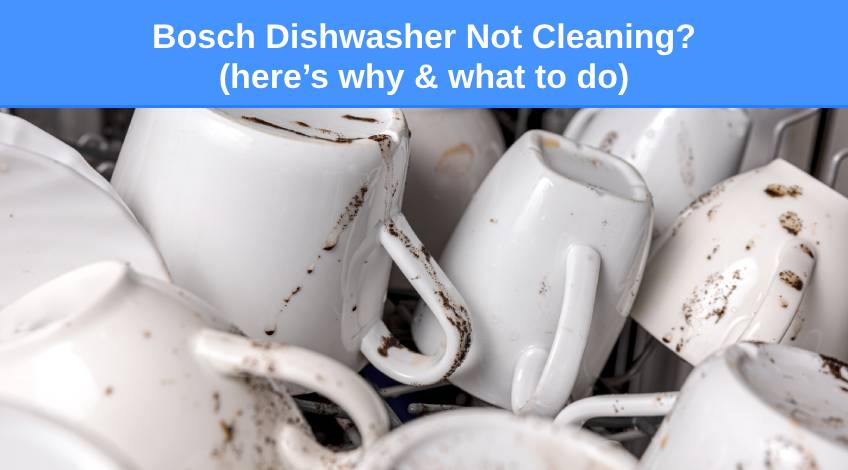
Bosch Dishwasher Not Cleaning? (here’s why & what to do)
Bosch dishwashers are well known for their reliability and great cleaning ability. However, at some point, you may find that your dishes are not cleaning as well as they should.
This can be worrying because you’ll most likely think that any repair is going to be costly. If your Bosch dishwasher has failed to clean your dishes, keep reading.
In this article we take a look at all of the likely reasons why your Bosch dishwasher isn’t cleaning your dishes and offer the best solutions to those issues. Many of which can be performed without any technical skills at all.
Why Is My Bosch Dishwasher Not Cleaning?
There are several reasons why your Bosch dishwasher might not be cleaning properly which include;
| Probable Cause | Solution |
|---|---|
| Overloading The Racks | Ensure dishes are loaded correctly |
| Using The Wrong Type Of Detergent | Always ensure that you use the correct type of detergent in the correct quantity |
| Defective Detergent Dispenser | Check and replace the detergent dispenser if necessary |
| A Lack Of Rinse Aid | Always ensure the rinse aid dispenser is topped up |
| Dishwasher Salt Reservoir Needs Topping Up | Always ensure the dishwasher salt reservoir is topped up |
| Low Water Temperature | Select a hotter wash cycle |
| Faulty Inlet Valve | Check and replace the inlet valve if necessary |
| Spray Arm Issues | Inspect and clean the spray arms to ensure they function correctly |
| Clogged Filter | Clean the filter |
| Low Water Pressure | Contact your local water authority |
Let’s take a closer look at each of these issues;
Overloading The Racks
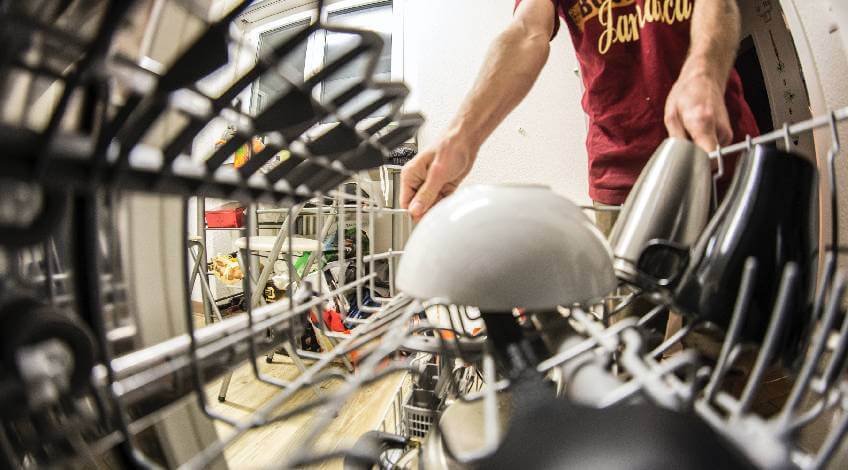
Overloading the dishwasher reduces its ability to wash and successfully clean every item. This is because the water is less likely to get to every part of each item if they are all crammed together tightly.
It also increases the possibility of items protruding through the racks and impeding the movement of the spray arms. This will prevent the water from being evenly distributed throughout the appliance.
You should always;
- Allow Enough Space Between Items
You should place each individual plate in its own slot, facing inwards and cookware like saucepans should be placed face down on the lower rack. The upper rack should be used for placing bowls, cups and glassware upside down. The cutlery basket should be used for knives, forks and spoons which should be placed alternately to prevent nesting. - Ensure The Spray Arms Are Not Blocked
Ensure that none of the items loaded on the racks protrude under the rack where they could stop the spray arms from turning. - Place Larger Utensils On The Top Rack
Placing Large spatulas and other cooking utensils on the top rack laying flat will prevent them from blocking the movement of the spray arms.
Using The Wrong Type Of Detergent
Issues with detergent is one of the most common reasons why dishwashers fail to clean dishes properly. You should always use the best quality dishwasher detergent that you can.
This will typically consist of a blend of soap, enzymes and rinse aid to remove food stains and reduce hard water deposits.
Defective Detergent Dispenser
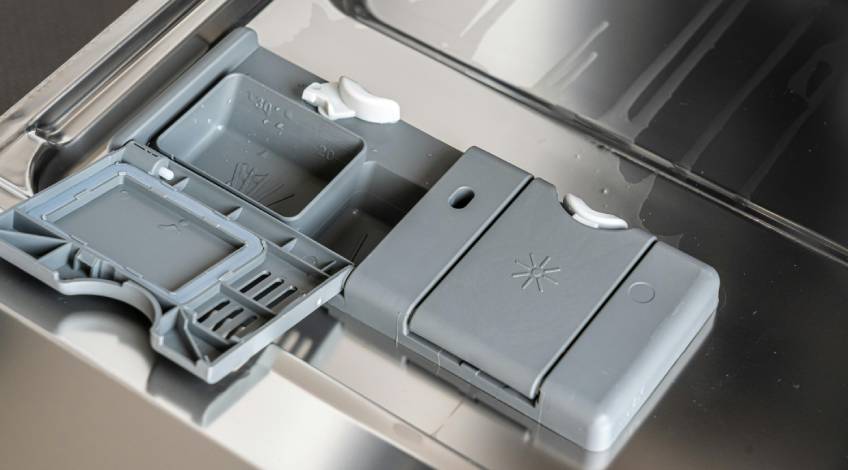
It doesn’t matter how good the detergent is if the dispenser is defective. The main problem here is typically the dispenser fails to open to allow the detergent to drop to the bottom of the tub.
This can often be caused by detergent residue clogging the dispenser preventing it from opening automatically at the right time in the cycle.
If the dishes in your dishwasher are dirty and the dispenser is still closed at the end of the cycle, the dispenser is most likely at fault. Check for detergent build up in the dispenser but if it is relatively clean, you may need to contact a technician to replace the dispenser.
A Lack Of Rinse Aid
This might not seem obvious at first glance, but a lack of rinse aid can prevent dishes from cleaning properly in the dishwasher. This is because the rinse aid actually breaks the surface tension of water droplets.
This increases the rate that dishes get rinsed as well as enabling the dishes to dry faster which prevents streaks.
Dishwasher Salt Reservoir Needs Topping Up
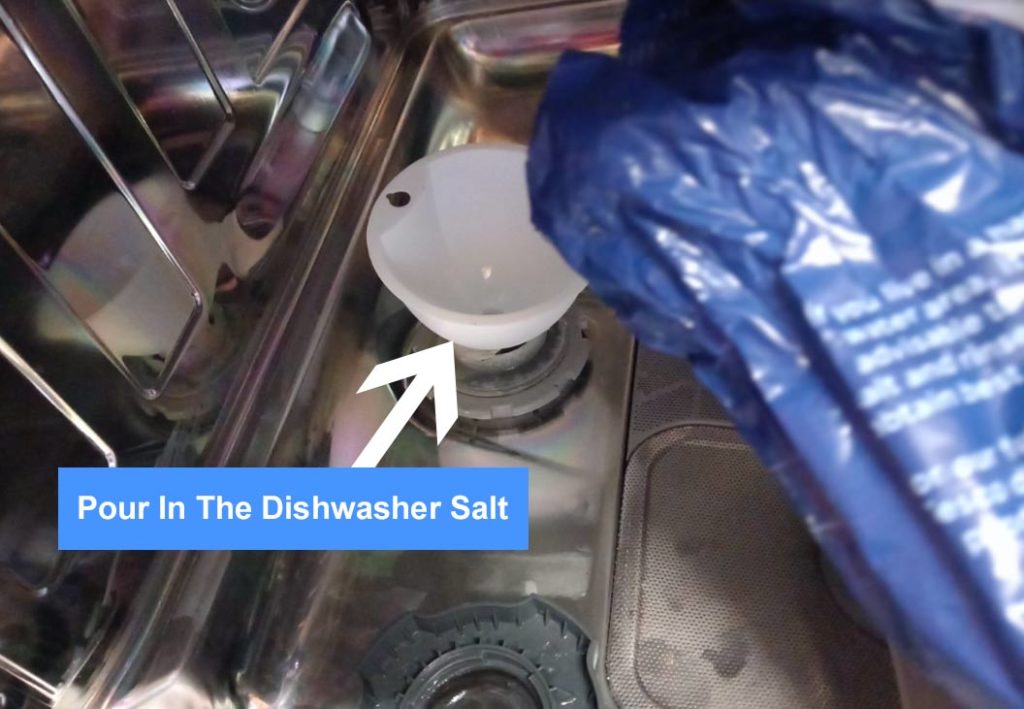
Your dishwasher is designed using soft water which can be problematic if you live in an area where all that is supplied is hard water. However, there’s no need to panic because that’s what dishwasher salt is for.
Dishwasher salt softens the water allowing the detergent to do its job and allow the dishwasher to function correctly. You should always keep the dishwasher salt dispenser topped up with dishwasher salt to assist in the functionality of the appliance.
Including getting your dishes thoroughly clean.
Low Water Temperature
If you find the dishes in your Bosch dishwasher are still dirty after the cycle has completed, the reason could be as simple as the cycle you selected, never got hot enough.
Try washing heavily soiled dishes using a hotter wash cycle as this is often all that’s needed to get them clean.
However, this could also be caused by a faulty heating element which will need investigating by a technician.
Faulty Inlet Valve
All of the water that enters your Bosch dishwasher does so via the inlet valve. If the inlet valve develops a fault, it might not allow enough (or any) water to enter the tub to facilitate adequate cleaning.
This is another job best left to a technician as it involves dismantling panels on the dishwasher.
Spray Arm Issues
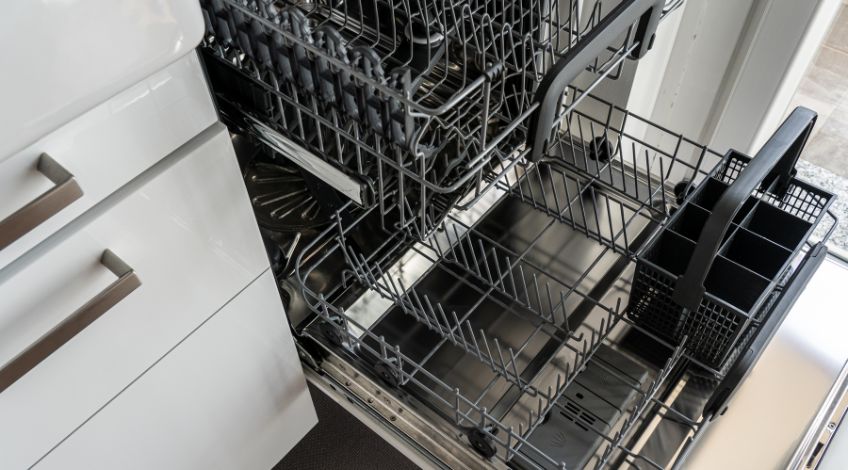
Your dishwasher relies on the spray arms to distribute water all around the appliance and over every item. You will need to check the spray arms for any damage, dirt and check the nozzles for any food or other debris preventing them from spraying.
You should also check that the spray arms turn freely and check the lower spray arm hasn’t come loose. This is a common fault on Bosch dishwashers, the lower spray arm only pushes into the fitting and over time, it can become loose and not connect with the water properly.
All you need to do is push the lower spray arm firmly into its housing. In some cases the spray arm can become defective which will mean no water is distributed at all.
If the spray arm proves to be defective, it will need to be replaced.
Clogged Filter
The filter is designed to trap all food particles and other debris that is removed from the items washed in the dishwasher. Over time the filter can become clogged which will impede the flow of wastewater through the appliance.
This can lead to items not getting cleaned correctly. You should clean the filter at least once per month to prevent this from becoming an issue.
Low Water Pressure
Your dishwasher needs a water pressure of at least 20 psi to fully open the inlet valve. If the water pressure entering your home is insufficient, the water inlet won’t open far enough to allow enough water into the appliance to successfully clean the dishes.
You can check the water pressure for your home by filling a 1 gallon (4.5 litre) bucket with water from the cold water tap in the kitchen. If it takes 30 seconds or less to fill, the water pressure is adequate.
Any longer and your home is receiving water at a low pressure. You will need to contact your local water authority if this is the case.
SEE ALSO: Bosch Dishwasher Troubleshooting Manual (the ultimate guide)
Frequently Asked Questions
If your dishes are not getting clean in your Bosch dishwasher it could be because; you are overloading the racks, using the wrong type of detergent, the detergent dispenser is faulty, the rinse aid dispenser needs topping up, the dishwasher salt reservoir needs topping up, the cycle you have selected used a low water temperature, the inlet valve is faulty, there is a problem with the spray arms, the filter is clogged or the water pressure is too low.
If your Bosch dishwasher is leaving residue on the dishes it could be due to not using enough detergent, using the wrong type or inferior detergent, the rinse aid dispenser needs topping up or the dishwasher salt reservoir needs topping up.
To keep your Bosch dishwasher working at its best, it is recommended that the filter is cleaned at least once per month.
Also, follow us on Pinterest ...



